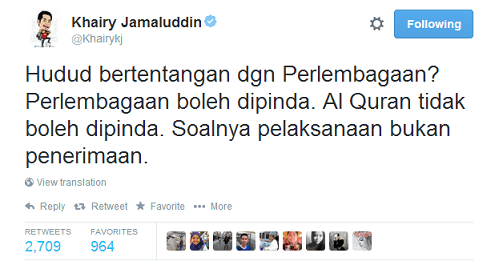Hudud, The Constitution, and The People
Loyar Burok
Who does the Federal Constitution belong to?
If I could cite one reason on why I love Constitutional and Administrative Law, it would be because out of all the modules, it is the one I see come to life the most, particularly in Malaysia. Recently, the one topic that has caught my — and everybody else’s — attention is the issue of hudud in Malaysia.
Parti Islam Se-Malaysia (PAS) is currently pushing for hudud to be implemented in Kelantan and this has caused tension between its coalition partners — particularly, the Democratic Action Party (DAP) who continuously insists that hudud was not part of the coalition’s plan.
In the legal sphere, many prominent lawyers have come out to state that such law would be unconstitutional. As a young law student, I seek to make sense out of this entire issue.
One of the arguments advanced for the possibility of its implementation was posted on Rembau Member of Parliament’s (MP), Khairy Jamaluddin, Twitter account on 25 April.
“Hudud bertentangan dgn Perlembagaan? Perlembagaan boleh dipinda. Al Quran tidak boleh dipinda. Soalnya pelaksanaan bukan penerimaan.”
(Hudud goes against the constitution? The constitution can be altered. The Koran cannot. The issue at hand is its implementation not its acceptance.)

His statement is a reminder that our constitution is a codified one; quite unlike the United Kingdom’s (UK), founded on a set of unwritten principles.
One of the weaknesses of having a codified constitution in Malaysia is that as long there is a two-thirds majority in Parliament, articles within the Federal Constitution can be altered or repealed. A good example of this would be what Dr. Mahathir (Dr. M) instigated many years ago in the process of crippling our judiciary. Article 121(1) of the Federal Constitution was amended. Initially, judicial power was to be vested in the High Court; the courts’ power was to be derived from our Federal Constitution. After its amendment, the courts are to draw their power from Federal Law. Judges’ powers are now restricted to what Parliament says they have.
What Dr. M did inherently stripped our once respected judiciary of its independence to what it is today. Morally speaking, one would of course call what he did wrong. However, he had the required support so legally what he did was not unlawful. Following this logic, as long as there is a two-thirds majority in Parliament for the Constitution to be amended to make way for hudud, we may find in the near future, the implementation of hudud will not be unlawful. In this sense, hudud can be made constitutional.
However, it is at this stage we have to ask ourselves a very important question: Who does the Constitution belong to — politicians or the regular man? To answer this, it would be appropriate to review what other acts Dr. M committed in 1988.


